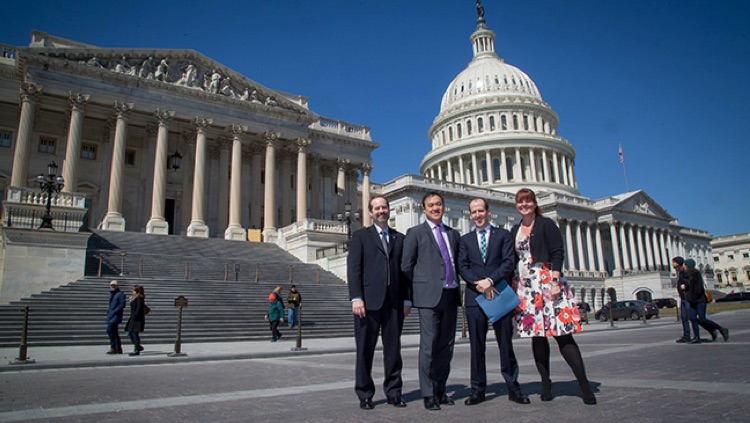Advocacy Network Newsletter
Sign up for the monthly Advocacy Network Newsletter to receive the latest science policy developments, advocacy engagement opportunities, and advance advocacy resources right to your inbox.
June 2024
Action Alert: Urge Congress to Support the BRAIN Initiative
It's not to late to send your representatives and senators a personalized message via the SfN Advocacy Action Center in support of the Brain Initiative in FY 25.
Meet the 2024 Early Career Policy Ambassador, Thomas Xin, on Neuronline
 Read more about current ECPA Thomas Xin’s research and advocacy projects. Explore the entire Meet the ECPA collection on Neuronline, SfN’s home for learning and discussion.
Read more about current ECPA Thomas Xin’s research and advocacy projects. Explore the entire Meet the ECPA collection on Neuronline, SfN’s home for learning and discussion.
Early Career Policy Ambassador, Anastasiia Gryshyna, Organized Local Advocacy Event
 Anastasiia Gryshyna, a 2024 ECPA, recently hosted an advocacy event at Birmingham Retirement Village in Alabama. Participants discussed neurotechnology, investments in neurotechnology, and the importance of voting and how it affects science. Learn more about Gryshyna's advocacy efforts on Neuronline.
Anastasiia Gryshyna, a 2024 ECPA, recently hosted an advocacy event at Birmingham Retirement Village in Alabama. Participants discussed neurotechnology, investments in neurotechnology, and the importance of voting and how it affects science. Learn more about Gryshyna's advocacy efforts on Neuronline.
Watch Now: 10 Years of BRAIN Initiative Funding — Building on a Decade of Innovation
Watch the recording of a congressional briefing that SfN co-sponsored with The American Brain Coalition, the American College of Neuropsychopharmacology, The Dana Foundation, the Simons Foundation, and The Kavli Foundation, reflecting on the successes made possible by The BRAIN Initiative. Ted Abel, PhD, moderated the panel, which included BRAIN Initiative Director John Ngai, PhD; Jon Nelson; Barbara Nelson; Helen S. Mayberg, MD; Christopher J Rozell, PhD; and Nanthia Suthana, PhD.
Across the Field
Action Alert: Protect the Use of Animals in Research at the VA
Urge members of Congress to oppose ending animal research at the Department of Veterans Affairs (VA). In the MilCon-VA bill, lawmakers included language to end animal research with canines, felines, and nonhuman primates at the VA by 2026. Many research projects that include these animals are still years away from completion.
NIH Director Testifies on FY 25 Funding
 Read about Monica Bertagnolli, MD, Director of NIH, testified before the Senate Appropriations Subcommittee on Labor, Health and Human Services, Education, and Related Agencies on the FY 25 NIH budget. Director Bertagnolli stated that by engaging government, industry, and academic partners, the NIH will enable health innovation on a national scale, supporting secure research access to data with advanced analytics and computational power. Congressional leaders stressed the importance of NIH’s work and the need for continued robust funding.
Read about Monica Bertagnolli, MD, Director of NIH, testified before the Senate Appropriations Subcommittee on Labor, Health and Human Services, Education, and Related Agencies on the FY 25 NIH budget. Director Bertagnolli stated that by engaging government, industry, and academic partners, the NIH will enable health innovation on a national scale, supporting secure research access to data with advanced analytics and computational power. Congressional leaders stressed the importance of NIH’s work and the need for continued robust funding.
House Passes First FY 25 Spending Bill
Learn about the recent passage of the Military Construction, Veterans Affairs, and Related Agencies Appropriations Act (MilCon-VA) for 2025 by the House of Representatives, marking the first FY 25 spending bill. The bill passed 209–197, largely along party lines, with four Democrats voting in support of the bill and two Republicans voting against the bill. The MilCon-VA Appropriations Act includes $923.514 million in funding for the VA Medical and Prosthetic Research Program in FY 25, a decrease of $19 million from the FY 24 enacted level.
Senator Cassidy Releases White Paper on NIH Modernization
Read the recently released white paper by Senator Bill Cassidy, MD (R-LA), ranking member of the Senate Health, Education, Labor, and Pensions (HELP) Committee, synthesizing responses to his September 2023 request for information (RFI) on NIH reform, including proposals on NIH’s basic research portfolio, the application and peer review process, the biomedical research workforce, research integrity, and NIH’s grant management process.
Save the Date: Rally for Medical Research Hill Day
Attend the 12th Annual Rally for Medical Research Hill Day, taking place Thursday, September 19, in Washington, D.C. The event will bring patients, caregivers, researchers, clinicians, and other advocates together for meetings with congressional offices in support of funding for NIH. A reception for attendees will be held Wednesday, September 18. Registration will be opening soon!
SfN Advocacy Resources
- Send a message to your members of Congress via the SfN Advocacy Action Center.
- Watch the Neuroscientist’s Guide to Advocacy series to understand the tools you need to help advance the field.
- Learn how to engage members of Congress and effectively advocate for science with SfN's Advocacy Best Practices.
- Get involved in global advocacy.
- Talk to the public about the importance of animal research.
- Reach out to advocacy@sfn.org for assistance in preparing for your next advocacy effort at home or on Capitol Hill.
Past Issues
To have the newsletter delivered to your inbox each month, sign in to your member account and opt in to the Advocacy Network.


















